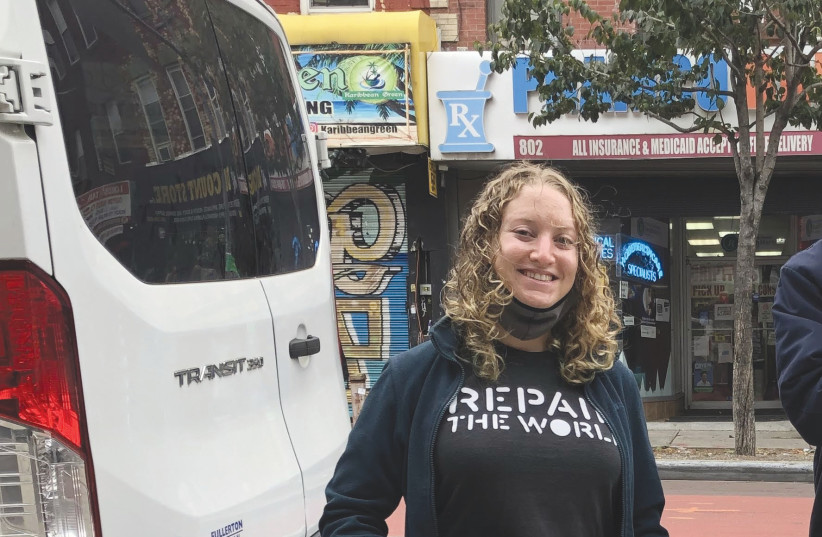After celebrating every Rosh Hashanah until now with family or friends, this year I spent the first day of the two-day holiday at Rikers Island, one of the most notorious jails in our country.
Almost 90% of the incarcerated individuals there are in pretrial, and the jail is known for its horrendously inhumane treatment of people in custody. The jail complex has been harshly criticized for records of abuse and neglect, leading to high rates of suicide and killings.
At Rikers, which the New York City Council voted to close down in 2027, it costs about $500,000 a year to detain one person. It would cost about $50,000 to provide that person with supportive housing for the same amount of time.
In my work at Repair the World, a national Jewish nonprofit, we focus on pursuing a just world through volunteer service and learning. We partner closely with service agencies that are meeting urgent needs in areas of food, housing, education justice, and carceral justice reform.
In my coordination of service learning projects in close partnership with local service agencies, I have repeatedly seen volunteers and beneficiaries connect through bridge building and witnessed volunteers become inspired to stay engaged in making changes.
At Repair the World, service is often defined as providing for peoples’ material and spiritual needs, and this Rosh Hashanah, I was able to lean into spiritual service in a way I hadn’t before.

When I saw an invitation from the New York Jewish Coalition on Criminal Justice Reform to volunteer at Rosh Hashanah services at Rikers by praying alongside Jewish people incarcerated there, helping them to feel connected to the Jewish community beyond the barbed wire, I knew that this was how I wanted to spend my holiday.
In reflecting on the day, a few moments remain with me as I envision a more just world in this Jewish New Year.
Jewish tradition teaches that on Rosh Hashanah, the Jewish people pass in front of God, who writes their fates. Throughout the day, we read the words Yom HaDin (Hebrew for Day of Judgement), another name for the holiday.
After reading these words with someone who has been at Rikers for over three years, he turned to me and said, “My judgment day is coming up next week. I’ve been preparing for my court date since I got here.”
Singing the liturgical refrains that praise God as merciful, the knower of truth, and the true judge, I found the words themselves to be disconnected from reality. Reading about fairness while being surrounded by people unjustly detained, often for years before even being tried, I struggled to look at the words. Yet, themes of hope and possibility surfaced in the Torah and Haftarah readings.
They recounted Sarah’s and Hannah’s remarkable experiences in biblical times of having children under unimaginable circumstances. This inspired me to open my prayer book earnestly while guiding others.
As a leader offered prompts connected to these forward-reaching themes, I listened to people share where they planned to move, what career paths they would take, to whom they would reach out, and what they would change after being released.
Hope and possibility bring vitality
There is a tradition to have those from priestly lineage give a blessing with tallitot (prayer shawls) covering themselves. Not knowing whether it was one of the volunteer prayer leaders or an incarcerated person blessing us, I felt in my bones that we were one people, one congregation.
We all kissed the same Torah; one of the Chabad leaders even let me carry it to the women. As for who could be invited for the honor of an aliyah (calling up) to the Torah, no distinction was made between volunteers and detainees.
There is a Rosh Hashanah prayer, U’netaneh tokef, which asks what our fate will be in the year to come: “Who shall live and who shall die, who by famine and who by thirst, who by earthquake and who by plague, who shall be at rest and who shall be tormented, who shall become rich and who shall become impoverished…”
Since we don’t blow the shofar when Rosh Hashanah falls on Shabbat, I found myself yearning for it. The name for the shofar blast with three sounds is called shevarim, meaning broken in Hebrew. Yet, we always end these sounds with a single long blast, representing fullness and repair.
Throughout Rosh Hashanah, I felt that the service, which embodies both prayer and bridge building, offered a small yet meaningful blast in helping people in a broken environment.
I’M GRATEFUL to the New York Jewish Coalition on Criminal Justice Reform and the Rikers chaplaincy for their ongoing work and to the other volunteers there with me that day.
All morning long, the Jewish people incarcerated at Rikers continuously shared how cared for they felt by having people join them on this holiday. While my reason for being there was for them and not for myself, by the end of the day I felt that this was the most sacred Rosh Hashanah I have ever experienced.
I pray that those with whom I spent that Rosh Hashanah day will witness repair and fullness in their own lives, the closing of Rikers, and the rebuilding of a system that embodies the compassionate, merciful, truth-knowing God found in the Jewish High Holiday liturgy.
The writer is the director of national partnerships at Repair the World, where she trains leaders in the Jewish service movement in ethical and effective Jewish service learning. She holds Masters degrees in Experiential Jewish Education and Bible, and believes in applying Jewish wisdom to enact social change and build community.
